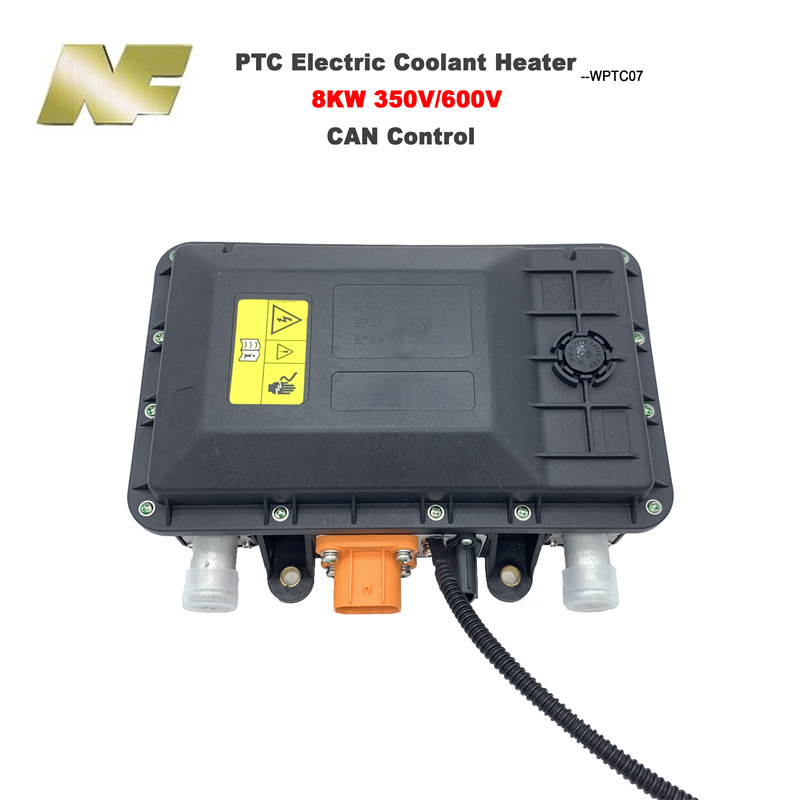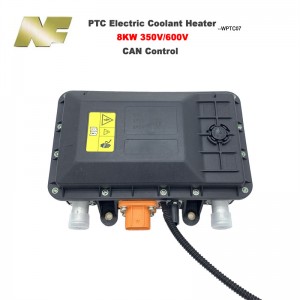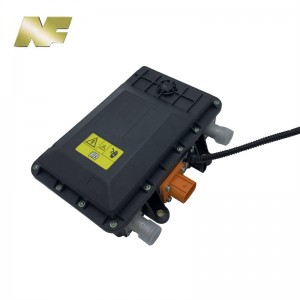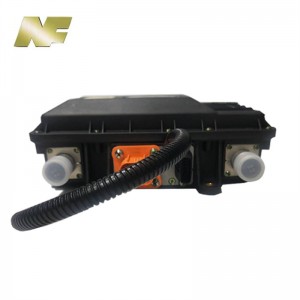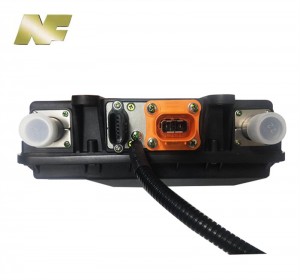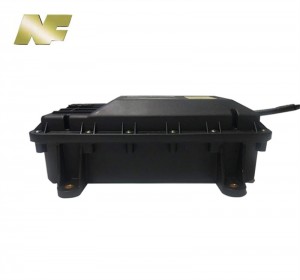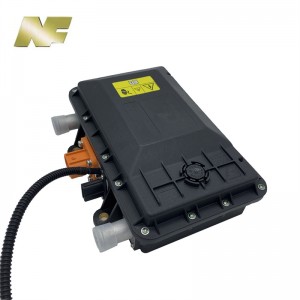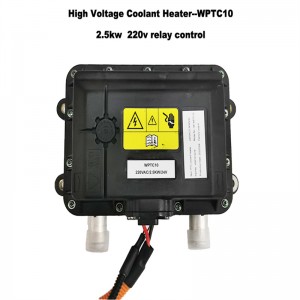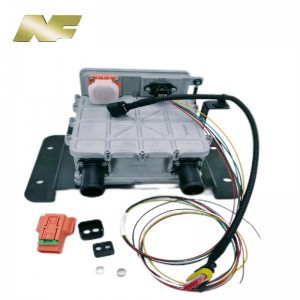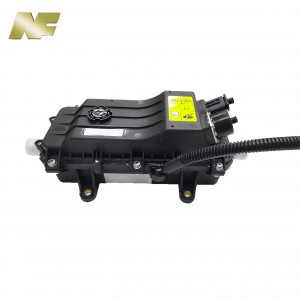NF 8KW DC600V High Voltage Coolant Heater DC24V HVCH Electric Vehicle Coolant
Technical Parameter
| Model | WPTC07-1 | WPTC07-2 |
| Rated power (kw) | 10KW±10%@20L/min,Tin=0℃ | |
| OEM Power(kw) | 6KW/7KW/8KW/9KW/10KW | |
| Rated Voltage(VDC) | 350v | 600v |
| Working Voltage | 250~450v | 450~750v |
| Controller low voltage (V) | 9-16 or 18-32 | |
| Communication protocol | CAN | |
| Power adjust method | Gear Control | |
| Connector IP ratng | IP67 | |
| Medium type | Water: ethylene glycol /50:50 | |
| Overall dimension (L*W*H) | 236*147*83mm | |
| Installation dimension | 154 (104)*165mm | |
| Joint dimension | φ20mm | |
| High voltage connector model | HVC2P28MV102, HVC2P28MV104 (Amphenol) | |
| Low voltage connector model | A02-ECC320Q60A1-LVC-4(A) (Sumitomo adaptive drive module) | |
Description
The rapid adoption of electric vehicles (EVs) has revolutionized the automotive industry. As this sustainable alternative to traditional gasoline-powered cars becomes increasingly popular, a key factor in ensuring optimal performance is the electric vehicle cooling system. In this blog, we dive into the importance and benefits of EV coolant, illuminating its vital role in maintaining the overall health and efficiency of your EV.
Learn about electric vehicle coolants:
Electric vehicle coolant, also known as EV coolant or electric vehicle coolant, is a specific type of fluid used to regulate temperature within electric powertrain systems. It is responsible for dissipating excess heat generated during operation by various components such as battery packs, electric motors, power electronics, and positive temperature coefficient (PTC) heaters.
PTC heater - improving comfort in electric vehicles:
One of the notable applications of electric vehicle coolant is its role in PTC heater operation. The PTC heater is designed to provide comfortable cabin temperatures in cold weather conditions without relying on energy stored in the high-voltage battery pack. This technology ensures that the range of an electric vehicle is not significantly affected by heater use, making it an important feature for electric vehicle owners in regions with harsh winters.
Efficient cooling - long battery life:
Effective heat dissipation is critical to maintaining the integrity and service life of electric vehicle battery packs. Electric vehicle coolant helps maintain the optimal operating temperature range of battery cells, preventing them from getting too hot or too cold. By ensuring that the battery pack remains within specified temperature ranges, the coolant system can extend the life of the battery, ultimately improving the overall performance of the vehicle.
Improving electric vehicle efficiency:
In addition to battery life, EV coolant makes a significant contribution to the efficiency of all electrical components within the powertrain system. By keeping the electric motor and power electronics at optimal temperatures, coolant systems reduce the risk of performance degradation and enhance power delivery, improving range and driving enjoyment for EV owners.
Protecting power electronic equipment:
Power electronics are responsible for converting and regulating current in electric vehicles and can easily generate heat during operation. This excess heat can affect their performance and lead to premature failure. Electric vehicle coolants mitigate this risk by absorbing and dissipating built-up heat, ensuring that power electronics operate within the recommended temperature range. Through its protective effects, the coolant system prevents potential damage, saving owners from costly repairs and ensuring consistent electrical performance.
Efficient thermal management:
Efficient thermal management is key to maximizing electric vehicle performance. Electric vehicle coolants are a key component in achieving this goal. By maintaining the optimal temperature range for each system, it can make energy consumption within electric vehicles more precise and efficient, thereby improving power utilization and overall performance.
in conclusion:
As electric vehicles continue to shape the future of mobility, the role of EV coolants in ensuring their optimal performance and longevity becomes increasingly important. From improving cabin comfort with PTC heaters to protecting power electronics and extending battery life, a well-functioning coolant system can significantly enhance the overall electric vehicle experience.
By striving to achieve efficient thermal management and provide a stable operating environment for all electrical components, electric vehicle coolants become the backbone of sustainable transportation. The importance of EV coolants will only continue to grow as technology advances and innovation advances in the EV industry, revolutionizing EV technology and pushing the boundaries of efficient and sustainable transportation.
Application


Our Company


Hebei Nanfeng Automobile Equipment (Group) Co., Ltd is a group company with 5 factories, that specially produce parking heaters, heater parts, air conditioner and electric vehicle parts for more than 30 years. We are the leading auto parts manufacturers in China.
Our factory's production units are equipped with high tech machineries, strict quality,control testing devices and a team of professional technicians and engineers endorsing the quality and authenticity of our products.
In 2006, our company has passed ISO/TS16949:2002 quality management system certification. We also bagged the CE certificate and Emark certificate making us among the only few companies in the world acquiring such high level certifications.
Currently being the largest stakeholders in China, we hold a domestic market share of 40% and then we export them around the globe particularly in Asia, Europe and Americas.
Meeting the standards and demands of our customers have always been our top priority. It always encourages our experts to continuously brain storm, innovate, design and manufacture new products, impeccably suitable for the Chinese market and our customers from every nook of the world.
FAQ
1. What is electric vehicle coolant?
Electric vehicle coolant is a specialty liquid used to regulate and maintain the temperature of electric vehicle battery packs, motors and other related components. It helps ensure efficient operation and prevents overheating.
2. Why is coolant important for electric vehicles?
Coolant plays a vital role in maintaining optimal temperatures for electric vehicle components such as batteries and motors. It helps dissipate the heat generated during operation, preventing damage from overheating and ensuring vehicle performance and longevity.
3. What is the difference between electric vehicle coolant and traditional vehicle coolant?
Yes, electric car coolant is different than traditional car coolant. The coolants used in electric vehicles are non-conductive and are designed specifically for the unique cooling requirements of electric powertrains. It's formulated to withstand higher temperatures and effectively cool the battery pack and motor.
4. How often does electric vehicle coolant need to be replaced?
Electric vehicle coolant change frequency may vary based on manufacturer recommendations. However, on average, it is recommended to change the coolant every two to three years or approximately 30,000 to 50,000 miles (whichever comes first).
5. Can the coolant of electric vehicles be replaced by ordinary antifreeze?
No, regular antifreeze should not be used as a replacement for electric vehicle coolant. Regular antifreeze is electrically conductive and could cause potential electrical shorts if used in electric vehicle cooling systems. Using recommended electric vehicle coolant is essential to ensure proper function and safety.
6. Do electric vehicles require a specific type of coolant?
Yes, electric vehicles often require a specific type of coolant recommended by the manufacturer. The coolant is specially formulated to meet the unique cooling requirements of electric powertrain components, ensuring efficient heat dissipation and optimal performance.
7. Can different brands or types of electric vehicle coolants be mixed?
Mixing different brands or types of electric vehicle coolants is generally not recommended. Mixing coolants can cause reduced efficiency and potential chemical reactions that can damage the cooling system. It is recommended to stick with the manufacturer's recommended coolant and consult a professional if you are unsure.
8. Can electric vehicle coolant be topped up? Or does it need to be thoroughly rinsed and refilled?
In most cases, EV coolant can be added if the level drops slightly. However, if the coolant has deteriorated significantly or there are major cooling system issues, a thorough flush and refill may be necessary. In this case, it's best to consult your vehicle's manual or seek professional advice.
9. How to check the coolant level of an electric vehicle?
The method of checking the coolant level may vary depending on the make and model of your electric vehicle. Generally, though, there is a coolant reservoir that allows you to visually check the coolant level. See your vehicle manual for specific instructions.
10. Can I change the coolant of my electric vehicle myself, or should I leave it to a professional?
While some people can change their electric vehicle coolant on their own, it's usually recommended to take it to a professional service center that specializes in electric vehicles. They have the expertise and equipment to properly change coolant and ensure that your vehicle's cooling system is in proper working order.

